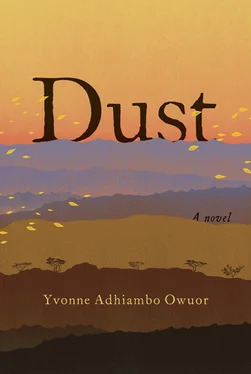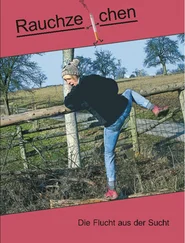The Trader says, “God and I are at peace.”
“OK,” says Petrus. Delirium, he concludes.
They turn the car south and set off again. The sun is high and hot. They race past a troop of baboons, the alpha male muscular, yellow-eyed, and shrewd; his troop look dried up and depressed by the heat. The Trader’s voice from the backseat: “You’ll find some changes at the mission.”
Galgalu wonders at his tone.
They drive for another two hours. A signboard: Light to the Nations Mission . A termite mound outside the mission’s fence has erupted with what might be read as a rude middle finger extended skyward.
Petrus switches off the car engine. Another board reads: Light to the Nations Medical Center . Behind that, a fenced compound with a solar-powered electrical fence. The drone of flies sounds like an electric razor. Petrus jumps out. Galgalu opens the car’s back door. They lift the Trader on the sheet, tuck his radio next to him, and carry him into the clinic.
The wind. Its empty moans. Buzzing flies. Pervading silence. The smell of smoke.
Dripping sounds within.
Unease.
The room is empty. Soot on some walls, ward beds unmade, bedpans overturned. A sinking sensation. Petrus looks at Galgalu. The Trader watches them both. Petrus asks, his face somber, “Where are the missionaries?”
The Trader giggles.
Petrus turns to study him. Changes at the mission . Petrus asks, “What do you know?”
“Heard something.”
“Heard what?”
“You’ll see.”
Petrus tells Galgalu, “Wait here,” and disappears through the small side gate that leads into the hanging flower garden and the house. Closed door. He knocks, waits, and then kicks the door ajar. On the clay steps leading to the door rests a new AK-47, its muzzle pointing red toward the door, its cartridges scattered, and the wall poked with bullet holes. The dripping sound seems to increase. Petrus moves toward the kitchen.
There, he sees the first corpse.
He counts the others. What is the last shape a human being holds before death? The question clears his mind. A black pocket Bible rests next to Pastor Jacobs. Bloody fingerprints. Petrus crouches, picks it up, wipes the blood with his hand, turns the pages, and reads: “Since Joseph was of the house and family of David he went up from Nazareth.…” He closes it and slips it into his shirt pocket, staining the shirt with blood. He picks up the AK-47, surveys the room. Steps to the entrance of a kitchen, a large, striped cat on its side, eyes staring. Stillness. What’s that color? Tortoiseshell? Who would shoot an innocent cat? A tremor starts in his bones.
Meanwhile, Galgalu cleans the Trader’s wounds, sprinkles a disinfecting powder in and around the opening. He wraps the Trader’s stomach with bandages dragged off shelves. He looks around for anything else that might help. Galgalu tries to shake off a heaviness that is invading his body and making him drowsy. A no-name feeling.
The Trader swallows down a handful of colorful painkillers.
They wait.
Petrus reappears, waits at the door with the rifle, points at the Trader without looking at him, focuses on Galgalu, and indicates out with his other thumb. “Wait in the car.” His voice is hard; his eyes are dark and dead.
The Trader reaches for Galgalu’s fingers. “Stay!”
Galgalu wrenches free and dashes out, stumbling on debris. Things clatter and roll. He runs from the dreadful thing that Petrus had become, and the ugliness that had just looked at him from the Trader’s eyes. Galgalu wavers, stares at the open door of the main house, past the pink and purple African violets hanging from white-painted rectangular buckets. The bad feeling stems from whatever is in there. He runs as if something large and fierce is after him.
Galgalu recites, “ La illaha illa ’lla Hu. La illaha illa ’lla Hu .”
The Trader turns to Petrus, who has lifted the AK-47.
“Ni yako?” Yours? Petrus asks.
“In a way.”
“Wacha kunichezea akili.” Don’t mess with me.
“Same source as yours.”
“Oganda?”
The Trader raises his brows — up, down; up, down.
“He knows about this?” Petrus’s voice is high-pitched.
“Naw.”
Petrus rasps, eyes dark. “How did the children offend you?” A vision of chaos. Petrus’s head throbs, his joints ache; tiredness coagulates into a moment filled with buzzing flies.
The Trader’s eyes are soft. “Didn’t mean it. Then I thought, ‘one for every one of mine.’ ”
The sun lightens the brown of the medicine bottles and throws a tainted shadow on the ground. “Why were they here?” The Trader sobs. “What are they doing here? This isn’t their home.”
“You should’ve asked them.”
“I did.”
Petrus shivers. Listening. Playing life-death. All of them. With shadows . Their reflections on shards of glass.
The Trader says, “My trade in secrets.”
“So?” Petrus asks.
“The world still craves my existence.”
Petrus’s laugh is bereft of noise. “Yours and mine.”
The Trader smiles. “Your name?”
“Does it matter?”
“I’ll tell you things about yourself. Name?” A challenge.
“Keah. Petrus.”
“The warlord?”
“Meaning?”
“Kenyan interrogation squad, 1968 to 1989, 1982. Your works include Nyipir Oganda.”
Petrus stares.
The Trader notes, “Your gun is trembling.”
Petrus lowers the gun against his thigh, observes his shaking hand. Outside, the call of ibis. Petrus digs for a cigarette to chew on.
Tears in the Trader’s eyes. “Nineteen eighty-four.”
“What about it?” Petrus voice cracks.
“The blood at Wagalla is not dry.”
“So?”
“I saw.”
“So?” Petrus’s voice is thin.
“I saw you.”
Petrus shuts his eyes. A 1984 northern-frontier security operation had gone out of control. Five thousand corpses later, he had been summoned to help clean things up. He had overseen the washing of the blood-spattered Wagalla runway, had arranged burials in secret sites, had terrorized would-be witnesses into what should have been eternal silences.
“My job,” Petrus snarled. “Where are the other patients?”
The Trader sniggers. “Bullet-created miracles. The dying rose, life restored.” The Trader squints at Petrus. “Cigarette?”
“Smoking kills.”
“Light me one.”
Petrus’s match flares over the end of a cigarette. He almost inhales. With reluctance, he relinquishes the stick to the Trader, who immediately says, “John 3:16.”
Petrus tilts his head.
The Trader says, “ Yalahi! I asked Pastor to forgive me for what I was thinking.”
“And?”
The Trader turns. “A very rude man.”
Flies are filling the room.
Petrus asks, “Your belly?”
“The gentle Mrs. Jacobs. Kitchen knife.”
Petrus says without zeal, “Good.”
“John 3:16.”
Petrus frowns. His head and joints ache. “The cat?”
“Ricochet.”
“All this death.”
Myriad other faces stare at Petrus, bloody shadows crawling from the past through cracks to be with him. Petrus focuses hard on the man lying broken on the bed.
The Trader says, “Correction: all this sacrifice.”
“Sacrifice?”
“Ya ibada.” For the liturgy.
“What?”
“You know. The liturgy that feeds nations. You’re one of its slaughtering priests.” Short laughter. Then a look. “Wanted to stop. Tried. Couldn’t.”
“You carried in an assault rifle.” Petrus’s voice is strained.
“To threaten.” Murmurs, “Only threaten. Wanted to stop, haki …” The Trader allows a grimacing “ Ratatata … something takes over.” He exhales smoke.
Читать дальше











